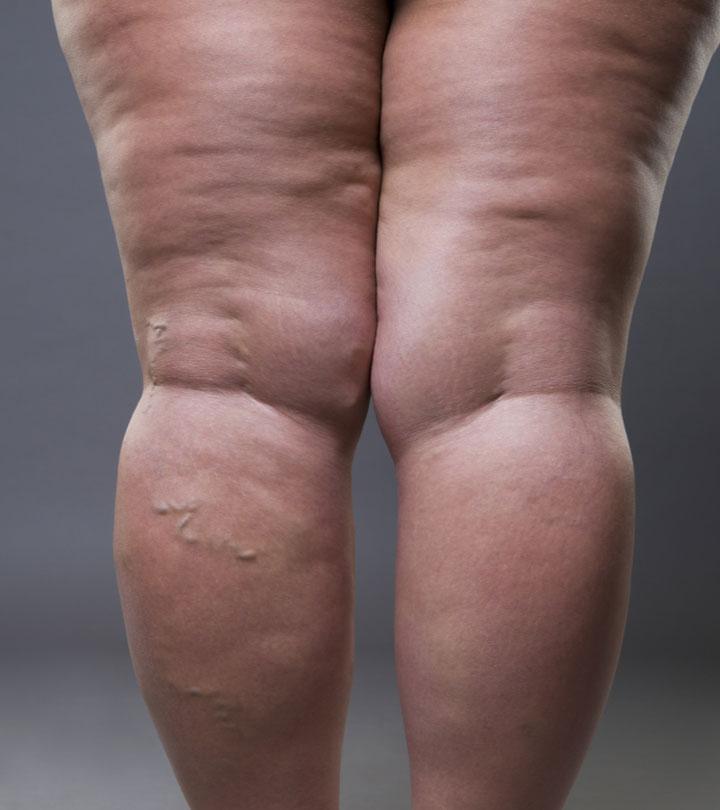What is Lipedema?
Lipedema is a long term progressive condition of fat and connective tissue which builds up in the legs, hips, bum and sometimes arms. It affects around 11% of women.
Generally, it presents itself on both sides of the body. It’s more common in women and rarely affects men. There are strong links between Lipedema and hormonal changes in the body, and it is also known to be hereditary. Lipedema is often mistaken for obesity or Lymphedema in the latter stages of the condition.
What are Varicose Veins?
Varicose veins are swollen and enlarged veins that usually occur in the lower limbs. They can appear blue or purple, and are often lumpy, bulging or twisted in appearance.
Other symptoms can include aching, heavy and uncomfortable legs, swollen feet and ankles, burning and throbbing in your legs and feet, muscle cramps in your legs and dry, itchy skin around the affected veins.
What Causes Varicose Veins?
Varicose veins develop when the small valves inside the veins stop working properly. In a healthy vein, blood flows smoothly to the heart. The blood is prevented from flowing backwards by a series of tiny valves that open and close to let blood through.
If the valves weaken or are damaged, the blood can flow backwards and collect in the vein, eventually causing it to be swollen, enlarged and sometimes twisted.
Types of Varicose Veins
• Trunk Varicose Veins – close to the surface of the skin and they are thick and knobbly.
• Reticular Varicose Veins – red and sometimes grouped close together in a network.
• Telangiectasia Varicose Veins – also known as thread or spider veins, they are small clusters of blue or red veins that appear on the legs or face. They’re harmless and do not bulge underneath the surface of the skin.
Lipedema and Varicose Veins
As mentioned in my blog ‘Lipedema Liposuction Pre-surgery Checklist’, a venous doppler scan to rule out the existence of prominent varicose veins in the legs is a prerequisite for WAL Liposuction surgery with Lipemedical.
There is a clear connection between Lipedema and varicose veins. However, even though varicose veins and Lipedema often appear together, one does not directly cause the other. The two conditions stem from unrelated causes and require different treatments; yet they share similar symptoms, such as pain, swelling, and a feeling of heaviness in the legs.
Treating Varicose Veins
During my venous doppler ultrasound at Veincentre in Manchester, the specialist found one small varicose vein on my right leg that needed to be removed. I also have various small thread veins on both legs, but these didn’t need to be treated in order to get the all clear from Lipemedical.
The venous doppler was £250 in total and this included a detailed report sent after the appointment via email, I then forwarded this to the team at Lipemedical. The follow up foam sclerotherapy treatment for the small varicose vein was £560, this included some medical grade compression to wear for a week after the treatment.
The procedure was quick and relatively painless, the specialist even treated my thread veins with microsclerotherapy which was included in the price. The worst part for me was wearing the compression garments. I am used to wearing Lipedema compression several times per week to manage my Lipedema symptoms, but after sclerotherapy it’s necessary to wear them constantly for a week, even at night.
I found this really challenging because it stopped me from sleeping properly, and I need my beauty sleep! However, I persevered and now I wear them during the day regularly to manage both conditions.
My Varicose Veins Now
As I am prone to venous insufficiency, it’s likely I’ll have some small thread veins on my legs forever. Sometimes trauma, such as the bruising caused by Lipedema surgery, can cause more to pop up in new places. Unfortunately, this was the case for me. So I recently visited Veincentre again for microsclerotherapy. As it was well over 6 months since my last visit in 2023, I had to have another doppler scan and consultation which was £250, then it was £450 for the procedure itself. It took around an hour and the team made me feel completely at ease. I’m only 1 week post procedure, so it’s a bit too soon to judge my results. But hopefully my thread veins won’t be quite as noticeable for summer, as I plan on wearing shorts and dresses again. I think I’ve realised that my legs will never be perfect, however I’m so much happier in my body.
Do you have Lipedema and varicose veins? Send me an email on so****@***********me.com and let me know whether you think there’s a link between the two.
Disclaimer: My blogs talk about Lipedema, diet, surgery and much more. I’m talking from my point of view to help women, and remind them they are not alone. I am not a medical professional, so the content above is from my own perspective with research I have done into the topic. It’s not meant as medical advice, you should always consult your doctor or a specialist for both your diagnosis, and a treatment plan.



